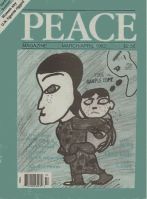
Peace Magazine Mar-Apr 1992, page 24. Some rights reserved.
Search for other articles by Adi Roche here
As the National Secretary of the Irish Campaign for Nuclear Disarmament, Adi Roche has made peace education a priority. She tours Irish schools with an introductory lecture and a kit for students to set up their own peace groups. She favors creative projects such as mural painting and book making because it empowers the children and she believes that "in the achievement of self-love we learn to become at peace within ourselves and this inner peace radiates out to all who come in contact with us."
TEACHERS have the daunting task of helping children to understand and deal creatively with a frightening and bewildering world. Children are frequently confronted with conflict, from personal disagreements and family disputes to the structural violence of prejudice and discrimination. They are inundated with television images of bombings and ecological damage, and they fear nuclear war. Inevitably they look to teachers for help and guidance.
To educate for peace is to re-appraise teaching methods and teaching content to ensure that the values of co-operation, participation and dialogue are reflected in the classroom. A school's organization, the behavior encouraged in pupils and the manner in which discipline is enforced all have important effects on the way pupils formulate their values.
We are looking for a world that will be free not only from overt war and violence but also from the structural causes of war and conflict. Our peace curriculum is thus concerned with poverty, racism, economic and social injustice, and environmental damage. It reflects a sympathetic understanding of the different cultures and races that now make up our complex, interdependent world.
Here are some ideas for enlightening the old curriculum.
Geography: Include issues of world development, and the imbalance of wealth between north and south; environmental issues, involving ethical judgments about priorities.
History: Could be more a "social" history, not just battles and wars. One lesson from history could be that a "balance of power" is never more than a short term way of avoiding war and that ultimately wars produce as many areas of conflict as solutions.
English: Children can be given the opportunity to express their own hopes and fears; they can learn, through literature, of the hopes and fears of others; they could learn the skills of listening, discussion, evaluation, dialogue, and critical judgment of information.
Languages: Through language, students can learn about different cultures, countries and people and therefore become more open, tolerant and understanding.
Science/Maths: Consideration could be given to the responsibility of science to society. Perhaps the role of various scientists, such as Einstein, could be examined and the impact of their discoveries analysed.
Games/Sport: Rather than encouraging severe competition, and value only those with exceptional skill, we could try to develop the talents of each child so that each may experience the satisfaction of participation.
Religious Education: Moral issues could include the right of conscientious objection to unjust laws.
During the Gulf War Adi Roche encouraged students to write to prominent Irish authors (rather than politicians) asking for their opinions about the conflict. The students made a book out of the responses and read them on a radio program. Excerpts from these letters are printed below.
My husband is Muslim although not Arab and so it is very easy for us to see through the American and British rhetoric. It is just more of the same old puritan self-righteousness, demoralizing others, in hot pursuit of its own self interest.
It is just another form of the wars waged by the Americans against the native peoples of their own continent<-the Indians-or the way the Tudors caused the great forests of Ireland to be burned down to flush out the mere Irish and kill us as you would game birds.
Is mise, le mor mheas.
Saddam Hussein is a ruthless dictator who has done very evil things in his own country and during the war against Iran. But I do have quite a strong feeling that the Arab nations should have been allowed to deal with his invasion of Kuwait in their way. I think the interference of the "Allies," mainly the Americans, will probably be more destabilizing for the Middle East in the long run, and there is a serious danger of a Muslim/Christian conflagration which would be disastrous for us all and cause the most terrible hardship and misery for millions of people.
Don't let us fool ourselves that we (and as Irish European people we are willy nilly involved) are fighting for democracy and are therefore heroic in some way. The fight is about power and money and oil and spheres of influence.
Tonight I watched prisoners of war. It would be a hard heart that did not melt to see them.
That is what we all are, prisoners of war and through this century there seems to be no release for us, from the prison that is war.
Prisoners of War
When you kiss the enemy, you remember
Home, Wife, Child and Family
So I kiss the enemy and remember
House, Bed, Hand-come to me.
My view, quite simply, is that war is entirely and utterly wrong. If you support war, you support murder. Innocent people are always killed in wars, usually in thousands or tens of thousands, sometimes in millions. This is a tragedy, not only for those murdered, but also for the rest of us who like to think we are rational beings who can solve our problems by talking and negotiating together.
Good luck to yourself and the class with this work.

Peace Magazine Mar-Apr 1992, page 24. Some rights reserved.
Search for other articles by Adi Roche here